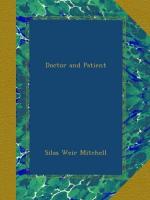likes power. But to go back to the more helpful
case. If you are wise, you ask what she means
by nervousness. You soon learn that she suffers
in one of two, or probably in both of two, ways.
The parentage is always mental in a large sense, the
results either mental or physical or both. She
has become doubtful and fearful, where formerly she
was ready-minded and courageous. Once decisive,
she is now indecisive. When well, unemotional,
she is now too readily disturbed by a sad tale or
a startling newspaper-paragraph. A telegram alarms
her; even an unopened letter makes her hesitate and
conjure up dreams of disaster. Very likely she
is irritable and recognizes the unreasonableness of
her temper. Her daily tasks distress her sorely.
She can no longer sit still and sew or read.
Conversation no longer interests, or it even troubles
her. Noises, especially sudden noises, startle
her, and the cries and laughter of children have become
distresses of which she is ashamed, and of which she
complains or not, as her nature is weak or enduring.
Perhaps, too, she is so restless as to want to be
in constant motion, but that seems to tire her as it
once did not. Her sense of moral proportion becomes
impaired. Trifles grow large to her; the grasshopper
is a burden. With all this, and in a measure
out of all this, come certain bodily disabilities.
The telegram or any cause of emotion sets her to shaking.
She cries for no cause; the least alarm makes her
hand shake, and even her writing, if she should chance
to become the subject of observation when at the desk,
betrays her state of tremor. What caused all
this trouble? What made her, as she says, good
for nothing? I have, of course, put an extreme
case. We may, as a rule, be pretty sure, as to
this condition, that the woman has had some sudden
shock, some severe domestic trial, some long strain,
or that it is the outcome of acute illness or of one
of the forms of chronic disturbance of nutrition which
result in what we now call general neurasthenia or
nervous weakness,—a condition which has
a most varied parentage. With the ultimate medical
causation of these disorderly states of body I do
not mean to concern myself here, except to add also
that the great physiological revolutions of a woman’s
life are often responsible for the physical failures
which create nervousness.
If she is at the worst she becomes a ready victim of hysteria. The emotions so easily called into activity give rise to tears. Too weak for wholesome restraint, she yields. The little convulsive act we call crying brings uncontrollable, or what seems to her to be uncontrollable, twitching of the face. The jaw and hands get rigid, and she has a hysterical convulsion, and is on the way to worse perils. The intelligent despotism of self-control is at an end, and every new attack upon its normal prerogatives leaves her less and less able to resist.




